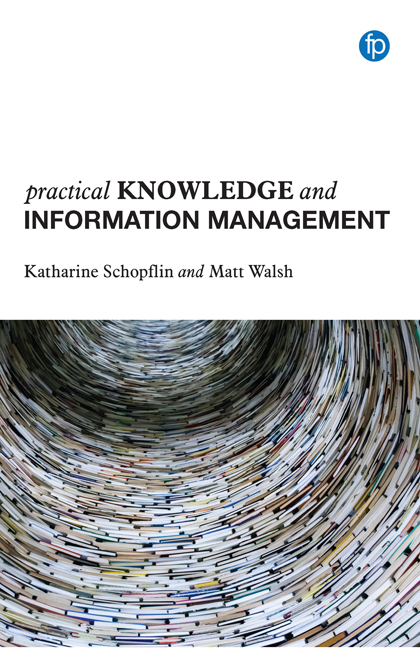Book contents
- Frontmatter
- Contents
- Case studies and sidebars
- 1 Introduction to knowledge and information management
- 2 Introducing knowledge and information management to organizations
- 3 Information management and governance
- 4 Communities and knowledge-sharing
- 5 Making knowledge explicit: knowledge bases, know-how and wikis
- 6 Capturing knowledge legacy: passing on staff knowledge
- Afterword: the future of knowledge and information management
- References
- Index
4 - Communities and knowledge-sharing
Published online by Cambridge University Press: 01 June 2019
- Frontmatter
- Contents
- Case studies and sidebars
- 1 Introduction to knowledge and information management
- 2 Introducing knowledge and information management to organizations
- 3 Information management and governance
- 4 Communities and knowledge-sharing
- 5 Making knowledge explicit: knowledge bases, know-how and wikis
- 6 Capturing knowledge legacy: passing on staff knowledge
- Afterword: the future of knowledge and information management
- References
- Index
Summary
While the previous chapter concentrated on tangible artefacts of KIM, this chapter looks at practices centred around people. These are perhaps the most difficult to define, implement and gauge success. As the first chapter described, KM originated as a people-centred area of study and it is only over time that it has become associated with tangible systems. Indeed, some consider the knowledge held inside people's heads to be essentially unmanageable. This area of KM, therefore, largely concerns methods of encouraging the exchange of knowledge between people. This might be in a more or less formal manner and as far as the practice of KM is concerned may have different levels of inter - vention. Most of our examples will be around online collaboration spaces, but we also address face-to-face knowledge-sharing.
In this chapter we discuss a range of different approaches to sharing know - ledge, broadly defined as communities of practice. These are groups formed in the course of negotiating their way through a shared part of working life, nonwork endeavour or common interest. They are considered to share a language, common practices and behavioural shortcuts, but may be unaware that they constitute a community of practice. As a knowledge manager, you may have a more or less formal role building, facilitating and recording such communities and their outputs. While the community of practice may already exist, you can add value by organizing events, providing and curating online tools, and helping to bring knowledge and learning from the community back into the organization.
Why would an organization support a community of practice? It is a cheap way (staff time allowing) of enabling staff to learn from each other and share infor - mation, not requiring classroom sessions, professional trainers or lots of one-to-one information transactions. The benefits are more than this: we potentially learn more in an ongoing process of engagement with our peers than from a one-off session within which knowledge is organized into discrete packages. This is not to say that classroom sessions are not valuable, but communities of practice provide a constant means of reinforcing and developing formally acquired knowledge and skills, and putting them into practice. Moreover, formal training represents an official version of practices, systems and skills.
- Type
- Chapter
- Information
- Practical Knowledge and Information Management , pp. 53 - 74Publisher: FacetPrint publication year: 2018



